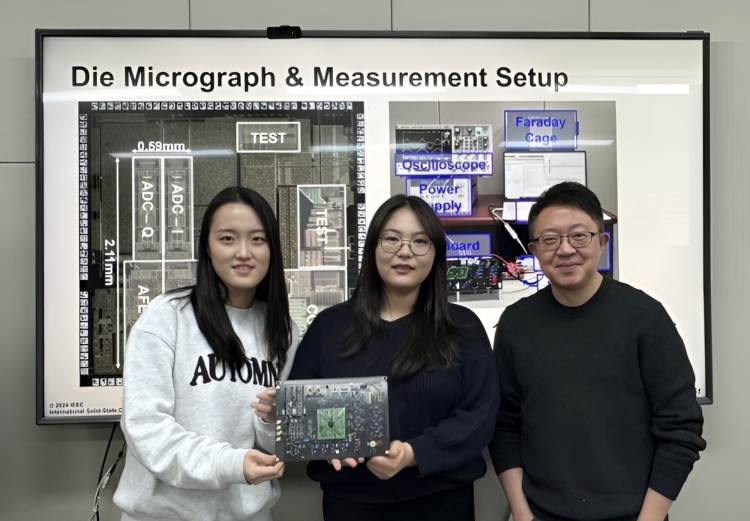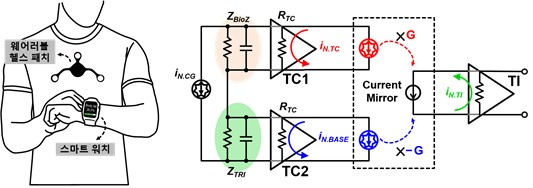
The growing interest in wearable medical devices, which monitor physiological signals to analyze users’ health and predict potential diseases, has fueled advancements in various measurement technologies. One notable example is bio-impedance measurement, widely recognized for providing body composition data through “InBody.” With significant improvements in resolution, this technology can also capture plethysmography, enabling the measurement of heart rate information and further expanding its applications in health monitoring.
Recently, an international research team developed a new method to measure bio-impedance with five times greater resolution than existing technologies, using only two electrodes. This breakthrough, especially significant for the miniaturization of wearable devices, was the result of a collaboration between KAIST’s IMPACT Lab, led by Associate Professor Minkyu Je, and New York University Abu Dhabi (NYUAD), led by Associate Professor Sohmyung Ha.
Compared to the conventional four-electrode system, which is less suitable for compact devices, the two-electrode system offers significant advantages in miniaturization. However, previous two-electrode systems have faced challenges due to baseline impedance interference and increased noise proportional to the measured impedance.

To overcome these limitations, the team developed an innovative semiconductor circuit design that effectively cancels out baseline impedance and associated noise. This design eliminates the need for a separate current generation circuit, reducing power consumption and improving measurement efficiency. The proposed system resolves noise issues caused by impedance phase and magnitude variations, achieving both high resolution and reliability.
“This bio-impedance measurement technology demonstrated up to five times better noise performance compared to conventional methods across various impedance models,” said Associate Professor Minkyu Je, a corresponding author of the work. “We believe this advancement will significantly contribute to the development of personalized health management and disease prediction technologies.”
The results of this work were published in the IEEE Journal of Solid-State Circuits, one of the most prestigious journals in the field of semiconductor integrated circuits and systems. The article, titled “A Bio-Impedance Readout IC With Complex-Domain Noise-Correlated Baseline Cancellation”, was featured in the journal in November 2024.

KAIST Ph.D. candidates Haidam Choi and Song-I Cheon were the co-first authors, while Professors Minkyu Je and Sohmyung Ha served as co-corresponding authors. The research was also presented at the International Solid-State Circuits Conference (ISSCC), the leading global conference in the field.
This work was funded by Korea’s Ministry of Science and ICT as part of projects focusing on continuous musculoskeletal monitoring and rehabilitation technologies, as well as the development of biosignal sensor-based exoskeleton devices and integrated systems.
Research Publication:
IEEE Journal of Solid-State Circuits (2024), DOI:10.1109/JSSC.2024.3439865
Title: A Bio-Impedance Readout IC With Complex-Domain Noise-Correlated Baseline Cancellation